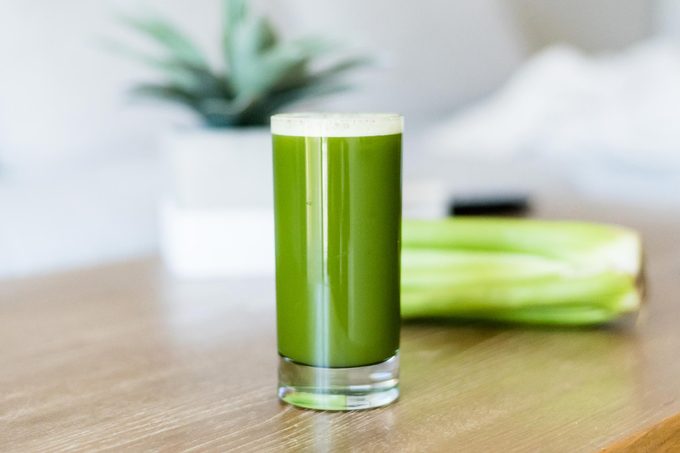This Is What Drinking Celery Juice Really Does to Your Body
Hint: It's not a cure-all.

Some people see juicing as an easy way to add more fruits and veggies to their diet. Although it isn’t a new trend or dieting hack, celery juice, in particular, is having a moment. The never-ending health claims of celery juice benefits are alluring—but knowing what it actually does to your body is more helpful.
So, what are the benefits of celery juice?
The one main benefit of celery juice is hydration, according to Ali Webster, PhD, RD, the Associate Director of Nutrition Communications at the International Food Information Council Foundation. “Considering that a 16-ounce serving of celery juice contains a full head of celery, it does provide more water than a typical serving the intact vegetable would provide,” she says. Very few people would eat an entire head of celery as their source of hydration, so it’s safe to say drinking it is more hydrating since you can easily consume more in liquid form, adds Malina Malkani, RDN, CDN, media spokesperson for the Academy of Nutrition and Dietetics and creator of the Wholitarian™ Lifestyle.
Aside from hydration and a few vitamins and minerals, there are very few other benefits of celery juice, Webster says. “Most of the claims of celery juice’s effects on health are anecdotal—they rely on one person’s experience after drinking it,” she says. But personal anecdotes aren’t the same as evidence. Plus, if someone starts drinking celery juice, they are likely making other lifestyle changes that could also account for things like weight loss or clearer skin. Here’s what’s really causing your constipation.
There’s not nearly enough research backing other claims
Celery juice health claims circling the Internet, however, include everything from helping weight loss and digestion to reducing inflammation and preventing cancer. Malkani and Webster warn these are serious and potentially dangerous claims. First, there’s no evidence to support celery juice’s ability to help with weight loss, Webster says. The juicing process strips away the fiber which makes people feel full and aids weight loss. The same goes for digestion benefits. “Some people think drinking it first thing in the morning ‘improves digestion’ of other foods they eat throughout the day,” Malkani says. “However, there is not enough evidence to support this notion.”
Similarly, there is no current evidence that celery juice prevents cancer, either. Some studies show that certain types of fruits and vegetables either protect against certain cancers or have components that protect against cancer. That said, there is no research specifically on celery juice and this benefit. There is a partial exception—whole celery has a flavonoid, apigenin, which shows some chemo-preventative effects in cell-based research. Webster notes, however, that these results haven’t been demonstrated on humans in controlled trials—and, again, this is talking about whole celery, not the juice. Still, it’s possible there are more health perks of celery juice that researchers have yet to study. Until then, know that the juice is doing next to nothing for your body. Here are 13 health “myths” that turned out to be true.
Celery and celery juice can still be part of a healthy diet
That said, whole celery is a different nutritional ballgame. “I want to be clear that celery itself is an excellent addition to a healthy way of eating,” Webster says. Celery is nutrient-rich and a great source of fiber, vitamins K and C, manganese, magnesium, calcium, potassium, folate, and vitamin B6, as well as riboflavin, Malkani says. Plus, whole celery has anti-inflammatory properties that promote the health of gut lining and may help regulate digestion, she adds. “There is plenty of evidence suggesting that whole celery has a wide range of health benefits that include reducing the risk of heart disease, liver disease, and gout,” Malkani says. “However, research on whether celery juice offers similar benefits is very limited.”
After juicing the celery, however, the liquid is bitter, and some people might need to add sweeteners to stomach the flavour—increasing calories and sugar. Malkani recommends putting whole celery into a smoothie instead so that you can “drink” it without destroying the fiber. Try it in one of these low-calorie smoothie recipes.
The bottom line is that, like anything else, celery juice isn’t a cure-all and drinking it won’t eliminate other unhealthy eating or lifestyle habits. If you enjoy the taste, then keep on juicing, stay clear of sugary sweeteners, and eat other fruits and vegetables, too. Remember, however, that drinking plain water is an equally valid way to hydrate—and you don’t have to add any extra ingredients to stomach it.
Next, find out which frozen foods nutritionists never buy.




